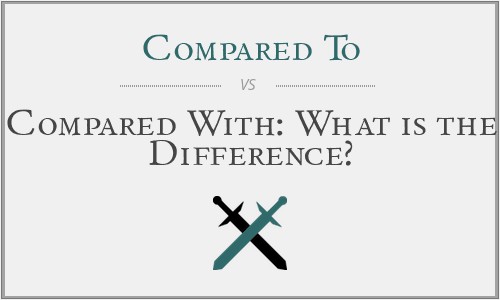The phrases “compared to” and “compared with” often appear interchangeable. However, subtle differences exist in their usage, impacting the conveyed meaning. This article delves into the distinctions between these two commonly confused phrases, providing clarity on when to use each for accurate and effective communication.
Comparing “Compared To” and “Compared With”
While both phrases involve examining similarities and differences, “compared to” emphasizes similarities, often highlighting likenesses between seemingly disparate concepts. Think of metaphors and similes; you might say “His anger was compared to a raging storm,” focusing on the shared intensity.
Conversely, “compared with” emphasizes both similarities and differences, often contrasting elements within the same category. For instance, “The new phone’s camera, compared with the previous model, boasts significant improvements,” acknowledges similarities while highlighting advancements.
 Compared To vs Compared With: What is the Difference?
Compared To vs Compared With: What is the Difference?
Practical Usage Examples: “Compared To”
“Compared to” shines when drawing parallels between distinct entities:
- Metaphorical Comparisons: “Her voice was compared to silk,” highlighting the smoothness and luxurious quality.
- Illustrative Comparisons: “The city’s skyline, compared to a concrete jungle, showcased towering skyscrapers,” emphasizing the dense and imposing nature.
Practical Usage Examples: “Compared With”
“Compared with” excels at analyzing items within a shared category:
- Analytical Comparisons: “This year’s profits, compared with last year’s, show a marked increase,” contrasting financial performance over time.
- Comparative Analysis: “Product A, compared with Product B, offers superior durability but at a higher price point,” evaluating features within the same product category.
Evolution of Language: Merging Meanings?
Historically, “compared with” held a stronger preference. However, “compared to” has gained significant traction in contemporary usage. This shift potentially signals a linguistic evolution where the two phrases converge toward a singular meaning.
Conclusion: Choosing the Right Phrase
While the distinction between “compared to” and “compared with” might appear subtle, understanding the nuances enhances clarity and precision in writing. By selecting the appropriate phrase, you can effectively convey intended meaning and ensure accurate communication. For highlighting similarities between dissimilar items, opt for “compared to.” When analyzing and contrasting elements within the same category, “compared with” provides a more accurate and comprehensive comparison. Ultimately, careful consideration of context and intended emphasis guides the appropriate choice.
